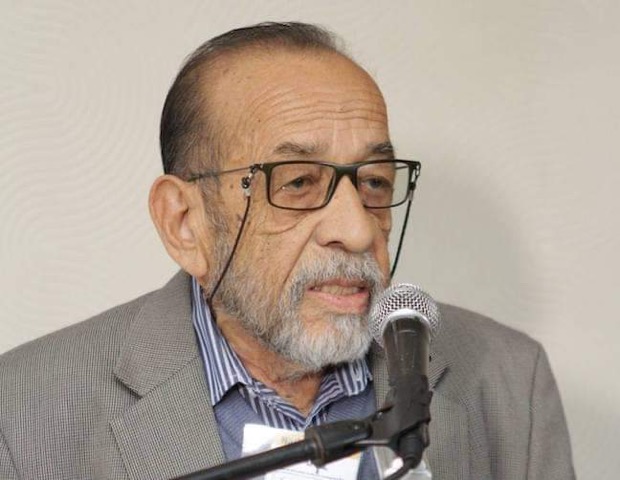
By Fuad Hendricks
Dr Shaukat Ali Thokan was a distinguished son of the Thokan family and his death on Thursday 20th June, 2019, was the culmination of a life lived in the service of humanity.
He touched the lives of many people for the better in several ways through his profound sense of community and social activism. As a medical doctor, he realised very early during his life that healing a society goes beyond prescribing medical remedies or through purely medical interventions.
He understood very clearly that all great things accomplished in life could best be done in partnership with others, as part of a collective. He and several other leaders in the 70s founded the Muslim Youth Movement. He realised that the youth was the best socially positioned to bring about the much needed change that the Muslim Youth Movement sought to achieve in South Africa. He led by example and gave the Muslim Youth Movement the much needed impetus to call the youth in particular to live a dynamic Islamic way of life in a contemporary society, namely, Islamic social activism.
Dr Shaukat had a strong passion to get buy-in from others for his activism, sense of community, and to join in to advance the collective agenda and purpose of the community and society. I could remember the day when I first met him in Uitenhage in the 70s, in the Eastern Cape, where he persuasively and passionately tried to convince me and my wife to join the Muslim Youth Movement. And joined we did. This was just part of his charismatic approach to strengthen the collective and build a cohesive community with a strong sense of common purpose. Right up to his last moments of sojourn on this earth, Dr Shaukat aimed to get buy-in from others and to get them involved in the community institutions as activists. It was his never ending pursuit for which he should be admired and revered.
Dr Shaukat had the disposition to manage and arbitrate astutely the many interpersonal differences which arose within the Muslim Youth Movement, and were likely to emerge in any collective or structured organisation. He was the calming voice on these occasions because he was more often than not cool, calm and collected, which was one of his strong personality traits.
What is the legacy that Dr Thokan bequeathed to his society and community?
In his deep reflections both personally and in consultation with others, he came to the realisation that in order to bring about the much needed change for the betterment in Muslim society, particularly in South Africa, it should be done through the building of strong institutions and human resource development and personal reform.
The South African National Zakah Fund (SANZAF) was one of the institutions which Dr Shaukat as part of a collective and dedicated team of strong willed and passionate individuals established. In the early years, particularly the 70s, it was a hard fought battle for him and others seeking to establish SANZAF because there was a contestation of ideas between different stakeholders in the community as to whether there was a need for an institutionalised Zakah Fund. At the time Zakah was mostly distributed at the level of the individual, family and other fragmented formations rather than as a well-organised, integrated, and capacitated institution administered by professional staff and supported by volunteers.
My recollection of that period of history of Dr Shaukat’s visionary and passionate mission to establish the Zakah Fund was that he was strong enough to have survived the name calling, and undermining by those who could not see the ultimate realisation of the developmental impact that an institutionalised Zakah Fund would have on our society and community in South Africa and even beyond our borders. He was not alone in the pursuit to make it happen; he was part of a team of persons who were driven by a higher purpose to bring this important altruistic, benevolent, bountiful, and developmental principle of Islam to share and ‘purify’ oneself and one’s wealth by giving Zakah as part of fulfilling one’s duty to Allah.
Ultimately, through his determination and that of the rest of the team they prevailed to build the SANZAF into a multi-million rand institution whose impact is continuing to change and grow the lives of our community and society.
I could remember the many conversations I and many others were part of when the issue of changing the method of dispensing of Zakah from mere handouts to a means of empowerment of both individuals and families, particularly to change the destiny of the community from poverty and lack of resources to growth, development and realisation of every individual and a family’s true potential.
Dr Thokan reflected deeply over the Hadeeth of Prophet Muhammad, peace be upon him, when he said: “Poverty leads to unbelief.”
Ahmed Sayed Moola, who worked very closely with Dr Thokan over many decades to build the institutional capacity of SANZAF, related to me on several occasions the letters and verbal messages that the Institution would get from families who were capacitated by the support. If I have to paraphrase some of the words in the letters it would convey something like this: ‘Shukran and a sense of gratitude for supporting me to graduate from university, and now I’m able to fend for my family and we are no longer in need of Zakah.’
Today SANZAF is in the hands of a strong, vibrant, proactive, innovative, and collective leadership. The institution is growing from strength to strength to meet the challenges of a society which are escalating and requiring even greater institutional capacity to resolve. It is precisely the kind of outcome that the late Dr Shaukat envisaged, lived for, and realised. Alhamdulillah!
There are those who pointed out that Dr Shaukat’s activism should have been more politically oriented, particularly within the context of our South African socio-political situation. The debate to shift the Muslim Youth Movement from a socio-cultural to a socio-political movement was passionately debated during the 70s and 80s at various forums and meetings. In his own-way Dr Shaukat had a political orientation, and his political activism focussed on the building of an institution like SANZAF to deal with the historical socio-economic challenges of South Africa.
However, the debate to shift the Muslim Youth Movement to a more socio-political orientation, focus and activism was relevant, important, critical, contextual, and much needed. It was an important dynamic at a time when the oppressed people were engaged in a struggle to free itself from colonialism and apartheid. It is a struggle that is still ongoing and a work-in-progress.
It is said that behind every great or successful man stands a woman. I think it would be more correctly to say in respect of Dr Thokan that his life partner, Farida, stood with him and not behind him in their pursuit to make a difference for the betterment of the community and society at large. She gave the back-office support which made it possible for him to do the unstinting community work and social activism that he pursued. Without Farida it probably would not have been possible for Dr Shaukat to have lived the accomplished life.
My wife and I have fond memories of Farida and her children. Her hospitality, simplicity, affability, kindness; and above all her lifetime and complementary role to Dr Shaukat to grow and develop our society and community are also her success and accomplishment. They were a splendid couple and their partnership would remain inspirational to me and many others. Farida passed away a few months ahead of Dr Shaukat.
Dr Shaukat like all of us was not perfect but his life was a continuous work-in-progress to become better and an optimised person.
There were several times when Dr Shaukat and many of us who know him reflected on what kind of society would be ultimately become and lamented over the youth and the fear that they would not uphold the Islamic heritage. Our fears were no less than the fears of many generations before us who pondered over the same issues. After deepened discussions about the future of the youth in South Africa, including our own children, we took solace in what the distinguished Fourth Caliph of Islam, also known as Imam Ali, said: “Every generation is born for its own time.”
The youth, including our children who succeed us, will live their lives as Muslims within the context of their time. Our concerns for them are understandable but they will shape their lives as Muslims within the contemporary society and epoch that they live.
Return we must to our creator, the Most High, and all of us will follow suit, sooner or later. Farewell, Dr Shaukat! You accomplished much, and we shall meet again at another time, place and in another life, Insha’Allah.


